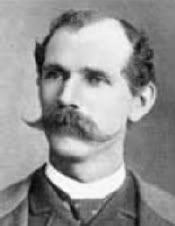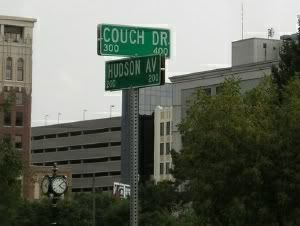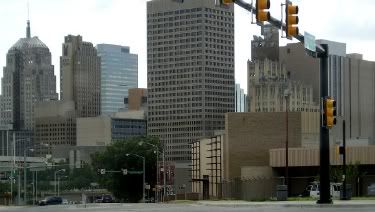Oklahoma City Mayors, Part 1, tells a little about our 1st mayor, William L. Couch, for whom Couch Drive is named.
Mayor From Until 1 * William L. Couch April 27, 1889 November 11, 1889 2 * Andrew Jackson Beale November 27, 1889 December 30, 1889 3 * D.W. Gibbs July 15, 1890 August 9, 1890 4 W.J. Gault August 12, 1890 April 12, 1892 5 O.A. Mitscher April 23, 1892 April 9, 1894 6 Nelson Button April 9, 1894 April 13, 1896 7 Charles Graham Jones April 13, 1896 April 12, 1897 8 J.P. Allen April 12, 1897 April 10, 1899 9 Lee Van Winkle April 10, 1899 April 8, 1901 10 Charles Graham Jones April 8, 1901 April 13, 1903 11 Lee Van Winkle April 13, 1903 April 10, 1905 12 J.G. Messenbaugh April 10, 1905 April 8, 1907 13 Henry M. Scales April 8, 1907 April 11, 1910 14 Dan V. Lackey April 11, 1910 June 8, 1911 15 Whit M. Grant June 8, 1911 April 13, 1915 16 Edward Overholser April 13, 1915 December 24, 1918 17 Byron D. Shear December 25, 1918 April 7, 1919 18 John Calloway Walton April 7, 1919 January 9, 1923 19 Mike Donnelly January 9, 1923 April 4, 1923 20 O.A. Cargill April 4, 1923 April 12, 1927 21 Walter C. Dean April 12, 1927 April 12, 1931 22 C.J. Blinn April 12, 1931 November 7, 1933 23 Tom McGee November 7, 1933 April 9, 1935 24 John Frank Martin April 9, 1935 April 11, 1939 25 Robert A. Hefner April 11, 1939 April 8, 1947 26 Allen Street April 8, 1947 April 7, 1959 27 James H. Norick April 7, 1959 April 9, 1963 28 Jack S. Wilkes April 9, 1963 May 3, 1964 29 George H. Shirk June 16, 1964 April 11, 1967 30 James H. Norick April 11, 1967 April 13, 1971 31 Patience Latting April 13, 1971 April 12, 1983 32 Andy Coats April 13, 1983 April 14, 1987 33 Ron Norick April 14, 1987 April 9, 1998 34 Kirk Humphreys April 9, 1999 November 3, 2003 35 Mick Cornett November 3, 2003 Present
WILLIAM L. COUCH


William L. Couch was born in North Carolina in 1850. In 1866 his father's family moved to Johnson county, Kansas, and four years later, settled at the town of Douglas in Butler county.If you want to know more about Couch's leadership and involvement with the earlier "Boomer Movement" in Payne County, click here.
In 1880 he became identified with the Payne-Oklahoma Colony and remained one of the most active leaders of that movement until, in November, 1884, he was chosen as Payne's successor.
He was the first mayor of Oklahoma City under the provisional government. He was shot during a dispute over a homestead claim at Oklahoma City, April 14, 1890, and died six days later.
The United States Army was charged with keeping the peace and good order during the Land Run days, the military contingent being largely taken care of by Capt. D.F. Stiles, and Couch, the provisional and then temporary mayor of Oklahoma City, would need his help.
As for the initial election, A History of the State of Oklahoma (1908), Vol 1, pp. 219 and following describes it thusly:
CALL FOR MASS CONVENTION."Captain Couch" (Confederate and so called in the Boomer Movement and so referenced in early writings) was elected temporary Mayor at the May 1, 1889, election.
Oklahoma City, April 26, 1889.
We, citizens of the city of Oklahoma, request the meeting in mass convention of all citizens of the city for the purpose of nominating a temporary mayor and city recorder to hold their offices until such time as there may be elected by ballot their successors, which election shall be held within five days from and after the election of said mayor and recorder. Such mass meeting to be held April 27, 1889, at the hour of 6:30 o'clock p. m., and every citizen of said city shall be entitled to vote. The election of said temporary mayor and recorder shall be by the voice, and shall vest in them the power to appoint police to preserve the order of said city, and the power to call said election for permanent mayor, recorder and prescribe the manner of holding said election. Said mass meeting to be held at the corner of Main and Broadway.
(Signed) Ledru Guthrie, J. B. Weaver (not a citizen of the city, but living near the same), John B. Banks, S. Lum Biedler, W. P. Easton, J. E. Carson, J. D. Drake, T. B. Riley, G. A. Biedler, p. m., O. H. Violet, Sidney Clarke, Bluford Wilson, D. A. Harvey, W. P. Shaw.
[220]
"Boomer" Payne, was chosen for mayor, and William P. Shaw for provisional recorder. It is said that at the conclusion of the convention, all united in a grand chorus of "Praise God from Whom All Blessings Flow." That a host of settlers, suddenly gathered in one spot from all parts of the country, united in voicing the familiar doxology, whatever may have been the depth of feeling with which it was sung, is hardly less significant of the homogeneity of this typical American assemblage than the unanimity with which they adopted resolutions providing for a civil government.
Following the appointment, in convention, of temporary officials, Mayor Couch issued a proclamation for a regular election, set for May 1st. The corner of Main and Broadway was one polling place, and all who lived south of Clarke street (now Grand avenue) were to cast their ballots at the corner of California avenue and Broadway.
His brief tenure as Oklahoma City's first mayor is nicely and contemporaneously described in several of the 1890 pages in the Letter of the Secretary of War to the US Congress.
From History of Oklahoma, Part 1, pages 219 and following,
The history of the provisional government of Oklahoma City embraces the principal events of the first year of the city's existence. The provisional government was the object of such active hostility on the part of the minority party, and involved so many question of fundamental importance in the career of the new country, that it was made the subject of an exhaustive inquiry by Congress, and the records of the time may be found largely in the reports made to Congress during its fifty-first session.A "Committee of Fifteen" was determined to call and have an election, apparently contrary to the legalities then involved. Mayor Couch enlisted the help of the military, Capt. D.F. Stiles, particularly. From page 223 of the same source,
Major Sanger in his report explains why the use of the military authority became necessary, in the character of the population that thronged over the site of Oklahoma City during the first day or so. "The crowd," he says, "was composed of people from all parts of the country, and embraced, among many honest settlers seeking homes, a class of dangerous lot-jumpers, land speculators, gamblers and sharpers, having no interest in the city or country beyond swindling the confiding and unwary, and pursuing their ordinary vocations as law-breakers. Of the truth of this there is ample evidence." The troops had entire charge of the city from April 22 to May 6, the United States marshals and the provisional civil authorities being unable to manage the great concourse of people without military aid.I'll not elaborate on this further here, but, if you're into detail, a more thorough read of the letters contained in the 1890 Secretary of War's report to the US Congress would probably catch your fancy.
It has been said that the de facto government of Oklahoma City, established soon after the opening, could not have existed without the support of the military. But this admission does not confirm the assertion, made by some in the early days of the city, that the troops were used to establish a quasi-martial law over the community, or that the influence of the civil authorities with the local commanding officers was unduly exercised to override the popular will. So far as the federal government interfered in local affairs, through its military arm, it was compelled to recognize the civil government established by regular and peaceable means. Furthermore, it appears that every time the troops were used to maintain order in the city, the local officers received instructions from their department commanders, and therefore could not be accused of discriminating in favor of one or the other faction.
Concerning the division of public sentiment in Oklahoma City during its first months, Major Sanger, who looked at conditions from the standpoint of the army, reported, in November, 1889, as follows:
"I have sought the views of many prominent citizens and am not without some information as to public sentiment on this point. Those who come within any of the classes referred to by me in these reports as gamblers, liquor dealers (or as they are called here, 'boot-leggers'), lot-jumpers and thieves, whose operations have been checked by the troops, do now, and will hereafter, unhesitatingly denounce them [the action of the troops and the established government]. They want no government, civil or military, which they cannot control, and are now to be found in the opposition. The body of reputable citizens is divided into two parties which do not follow the lines of the two great parties of the country, but along the lines of local interests. They are distinguished by [page 224] the names of two rival townsite companies organized before the opening of Oklahoma to locate townships and to secure town lots. They are the survivors of such companies on hand at the opening, and are known as Seminoles and Kickapoos; the latter in opposition to the civil and military government. As distinguished from the Kickapoos, I believe that every prominent business man in Oklahoma is either neutral or on the Seminole side. They have confidence in the military and desire to retain it here, with its sphere of duties undiminished. ***
Although Mayor Couch (barely) survived this period (as noted above, he was shot over a homestead claim at Oklahoma City, April 14, 1890, and died six days later), little could he know that the infant and raucous city he presided over during a few months in 1889 ...

would become this ...
Click the image for a larger pic

Here endeth the lesson, and our 1st mayor.














3 comments:
Are you going to do all 33 (Jones and Van Winkle had two terms each)?
Sheer coolness. :)
Probably not. Those that I'm working on now are Overholser (next), Latting, Ron Norick. I'll eventually do Shirk and Cornett, maybe others, I've not thought it through.
Yes, I would like to see William L. Couch 1st Mayor of OKC put up as a great Oklahoma too. I am a direct desendent of him. I live in Tulsa, Oklahoma and have lived in Oklahoma all my life. Since he did not keep the land he wanted in Oklahoma it would be good to see him remember as much as we can.
Thank you,
Alan G. Couch
Post a Comment